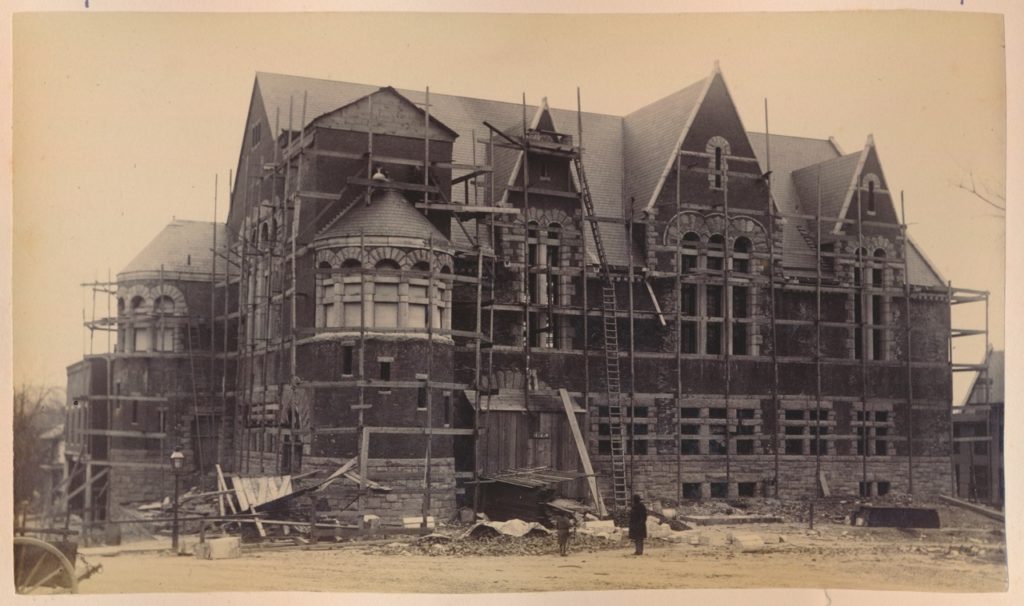REPORT: MEETING OF THE AMHERST HISTORICAL COMMISSION (5/28/20)

Town Hall Under Construction (ca. 1866). Photo: Amherst Historical Society
The meeting was held via Zoom webcast and was recorded for possible future broadcast. Attending: Regular members, Patricia Auth, Robin Fordham, Jan Marquardt, and Hetty Startup. Absent: Jane Sheffler, Clerk and Chair Jane Wald. Wald would have been obliged to recuse herself from the public hearing as she is an employee of Amherst College, the appellant. Ted Stevens is still listed as a member but staff reports that he resigned several months ago and has not been replaced. Also present were staff liaison and Planner Nate Malloy, and Ben Breger who will be assisting the Historical Commission, Local Historical District Commission and Community Development Block Grant Committee beginning June 1.
Public Hearing On The Demolition Of A Residence at 205 Pleasant Street
The meeting opened with a public hearing for the demolition of the single-family residence at 205 South Pleasant St. (corner of Walnut Street) by Amherst College which has plans for a new building on the abutting lot which “will interfere” with this farmhouse which the college is in the process of acquiring. The College was represented by two employees, with Mark Andrews making the presentation. The College has a “rough” verbal agreement with an anonymous person to move the house to a different site. The person was found via “word of mouth through internal channels.”
The Board voted unanimously to consider whether this property fell under the demolition delay guidelines in case the offer to move the house did not materialize.
The guidelines are found in Article 13.410 of the Zoning Bylaw. The house in question is a Greek Revival farmhouse, gable end to the street, built in 1869. It appears to be excellent condition. Its architecture, while having interesting and attractive style elements on the east façade, was just an ordinary farmhouse for middle income people living in Amherst after the Civil War. However (Sect. 13.412) the house has been an integral part of a neighborhood of historical homes restored and maintained by the College over many years. For these reasons the Commission unanimously voted to impose a one-year demolition delay on the house.
Demolition Delay Bylaw
Next followed a public meeting. There was no progress in finding a permanent location for the Town’s Civil War tablets, so this item was placed on the agenda for the June meeting. Work is continuing on revising the Demolition Delay bylaw. It is recommended that it be a General Bylaw of the Town rather than a zoning bylaw since it would make for a more stream-lined appeal process if it doesn’t have to go to the Zoning Board of Appeals. Massachusetts Historical Commission is willing to help Amherst write the bylaw.
Projects In Process
Pioneer Valley Planning Commission has identified about a dozen local barns out of the more than 100 they have studied so far that could be designated for further study if funding becomes available.
The Writer’s Walk signs (in process for about fifteen years) are about to go out to contract. Three or four businesses are interested in making the signs. The Commissioners discussed whether to make a new website or link the Town website to the one that was started by the person who originated the idea of a trail of the homes of great Amherst authors. It was also suggested that one might want to note the many living Amherst authors and poets on the same website.
Lastly, Archipelago would like the Town to “sign off” on the Town mural at One East Pleasant Street that had to be replaced per Conditions on the Carriage Shops Demolition Permit. Several issues are still outstanding such as the content of the two signs also required: 1) what/who is/are depicted in the mural, an interpretation of the mural, and 2) an entrance sign at the West Gate of the West Cemetery. It also needs to be determined how this information will be promulgated to the public.
All these discussions will continue to the next agenda.
